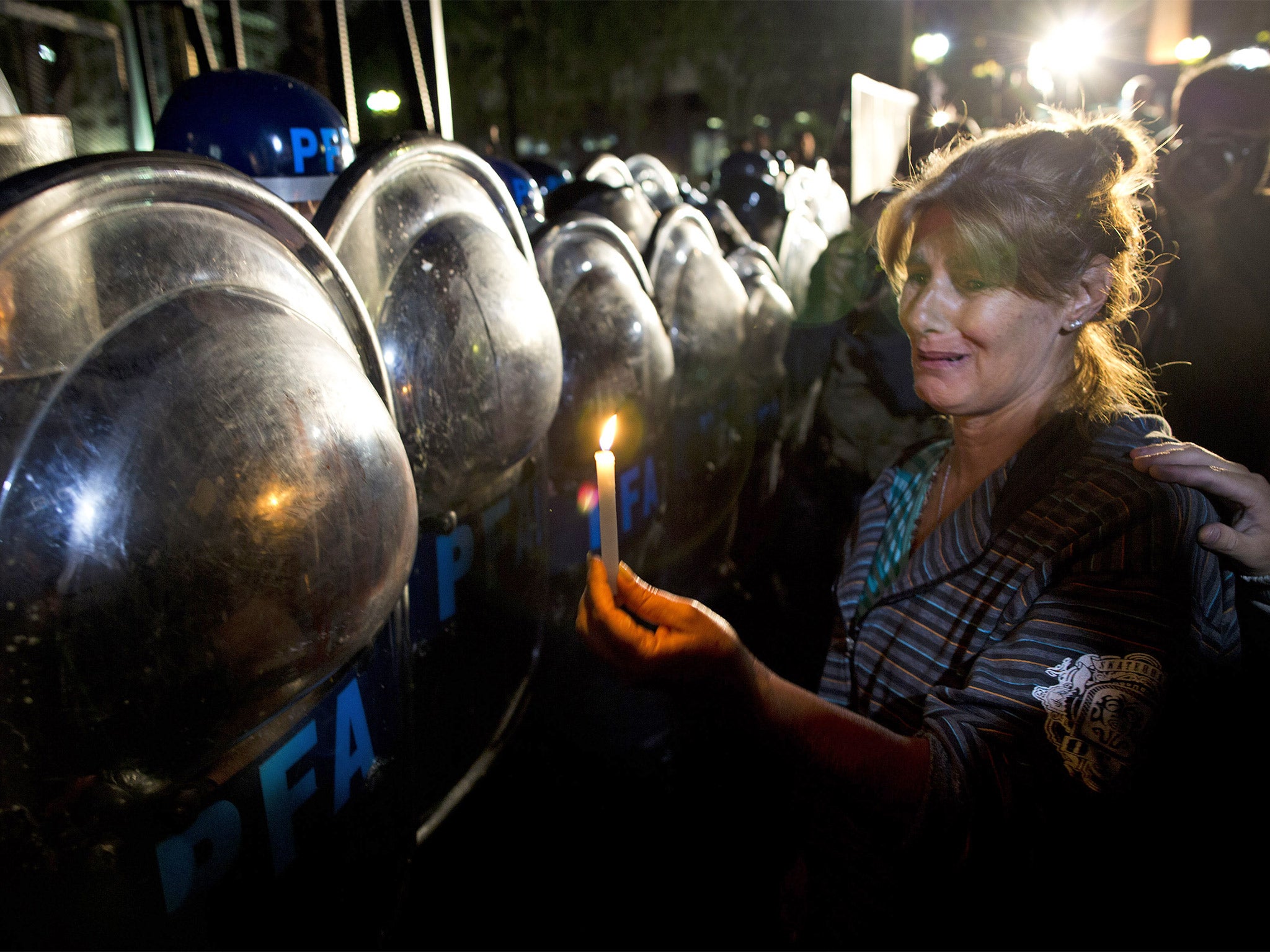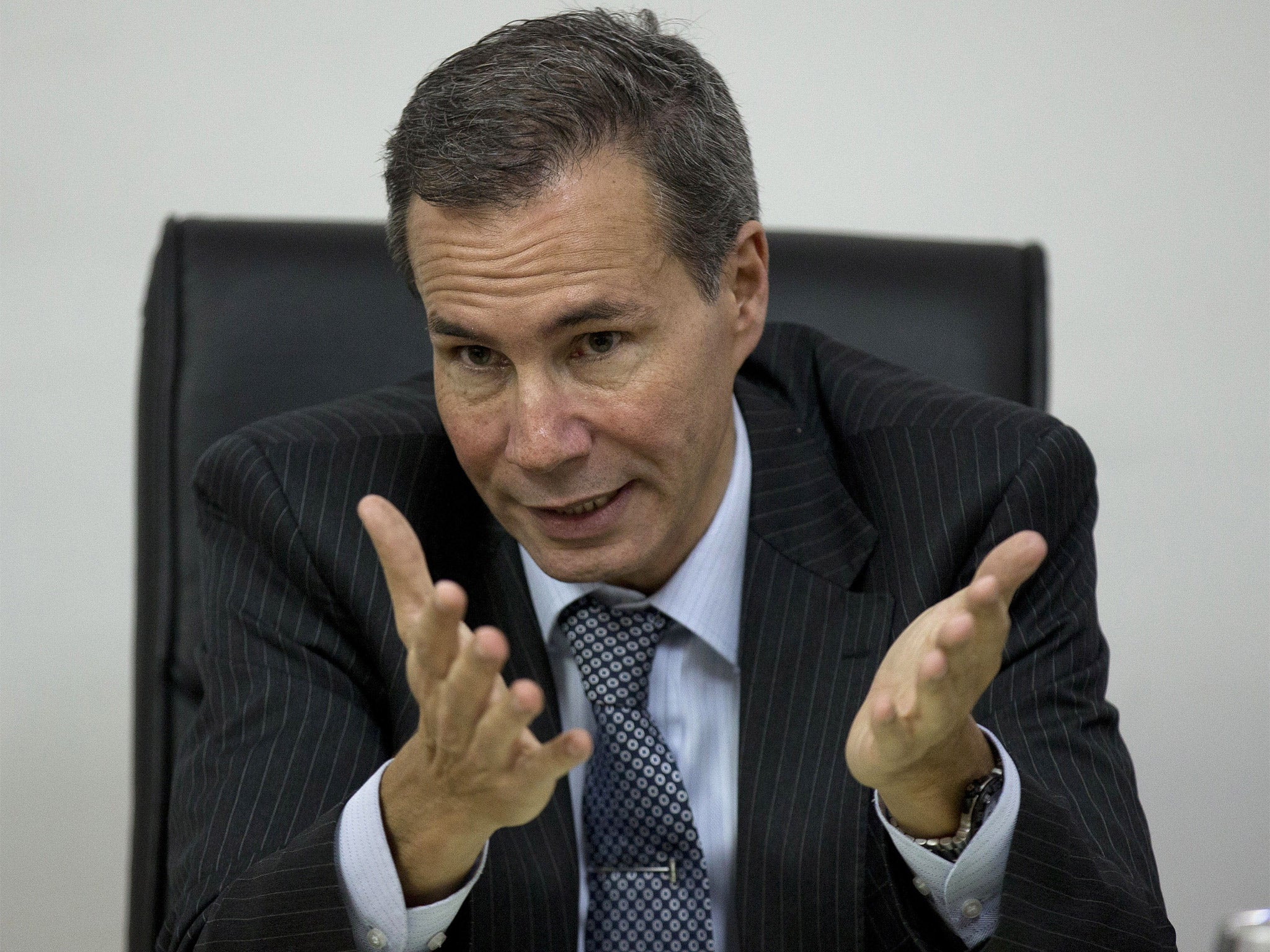Argentina erupts in protest over mystery death of prosecutor investigating bombing of a Jewish community centre in 1994
Alberto Nisman claimed he was close to revealing a widespread government cover-up of Iran's involvement in the atrocity

Your support helps us to tell the story
From reproductive rights to climate change to Big Tech, The Independent is on the ground when the story is developing. Whether it's investigating the financials of Elon Musk's pro-Trump PAC or producing our latest documentary, 'The A Word', which shines a light on the American women fighting for reproductive rights, we know how important it is to parse out the facts from the messaging.
At such a critical moment in US history, we need reporters on the ground. Your donation allows us to keep sending journalists to speak to both sides of the story.
The Independent is trusted by Americans across the entire political spectrum. And unlike many other quality news outlets, we choose not to lock Americans out of our reporting and analysis with paywalls. We believe quality journalism should be available to everyone, paid for by those who can afford it.
Your support makes all the difference.The protests were tinged with sadness, disbelief and anger. Many of the thousands that thronged to Plaza de Mayo in Buenos Aires believed Alberto Nisman was the 86th victim of the bombing he spent more than a decade investigating. “No more lies!” the placards read. “Enough!”
On Sunday, the 51-year-old prosecutor was found dead in his apartment in the Parc complex. After more than 10 years, he was approaching the moment when he would, he said, reveal the widespread government cover-up of Iran’s involvement in the bombing of a Jewish community centre in 1994.
Puerto Madero, where Mr Nisman died, is among the most tranquil and coveted districts of Argentina’s capital. With round-the-clock security, the area is also renowned as being one of the safest. It was in his bathroom on the 13th floor that Mr Nisman was found, with a single bullet wound to the right side of his head. The front door was locked, a note was left inside which instructed his cleaner to buy provisions on Monday. Mr Nisman had apparently not planned to die.
The Argentine prosecutor had, less than a week previously, publicly accused the President, Cristina Fernandez de Kirchner, the Chancellor, Hector Timerman, and several of their aides of initiating a cover-up in the investigation of Iran’s involvement in the bombing of the Amia Jewish community centre.
His death triggered protests across the country: in the provinces of Santa Fe and Cordoba, and in Buenos Aires. The largest public gathering took place in the capital. Many attending came looking for answers. “I feel indignation. His death was induced,” said Lidia, a shop assistant. “Whether he was killed or he took his own life is irrelevant. As a nation we aren’t conscious of the importance of protecting our justice system.”

Monica, a pensioner, said Mr Nisman had the courage to stand up for what he believed was right. “He paid the ultimate price for daring to speak out against the government.” Today, Argentina’s Jewish community will march in protest against Mr Nisman’s death. The rally will finish at the building that was the target of the 1994 terrorist bombing. Guillermina Sutter-Schneider, 28, told La Nacion that she believed Mr Nisman had “been driven to suicide”. She added: “The government should have protected him.”
The official investigation into his death has been rapid. By Monday afternoon the autopsy results were announced by the prosecutor Viviana Fein, which concluded no third party was involved but that the gun used – a .22 semi-automatic – was not his, but that of an associate. But today, forensic results concluded that no traces of gunpowder were detected on his hands – potentially ruling out suicide.
“I hope the justice system investigates what happened and, if the government is responsible, that officials are sent to prison,” said Fernando Lucero, a 42-year-old lawyer at the Buenos Aires demonstration.
Mr Nisman claimed that Ms Kirchner hoped to clear the suspects in order to forge a trade agreement to swap grain for oil from Iran. That was denied by Ms Kirchner. Mr Nisman was due to present his findings in a closed hearing in Congress on Monday. Colleagues said the prosecutor was confident that his case against the government was sound.
In the days leading up to his death, he was described as being defiant and in good spirits, with no signs to indicate that he was suicidal, according to his family.
Today, a judge ordered that urgent measures be taken to preserve Mr Nisman’s evidence, namely the CDs which recorded tapped telephone conversations and other documentation. These were declassified on Monday evening by the national intelligence secretariat Oscar Parrilli by order of the President herself. In a letter on her website, Ms Kirchner lamented Mr Nisman’s death, saying it generated “questions”. She initially used the word “suicide” in connection with his death but later put a question mark next to the word. For her, as everyone else in Argentina, the doubts remain.